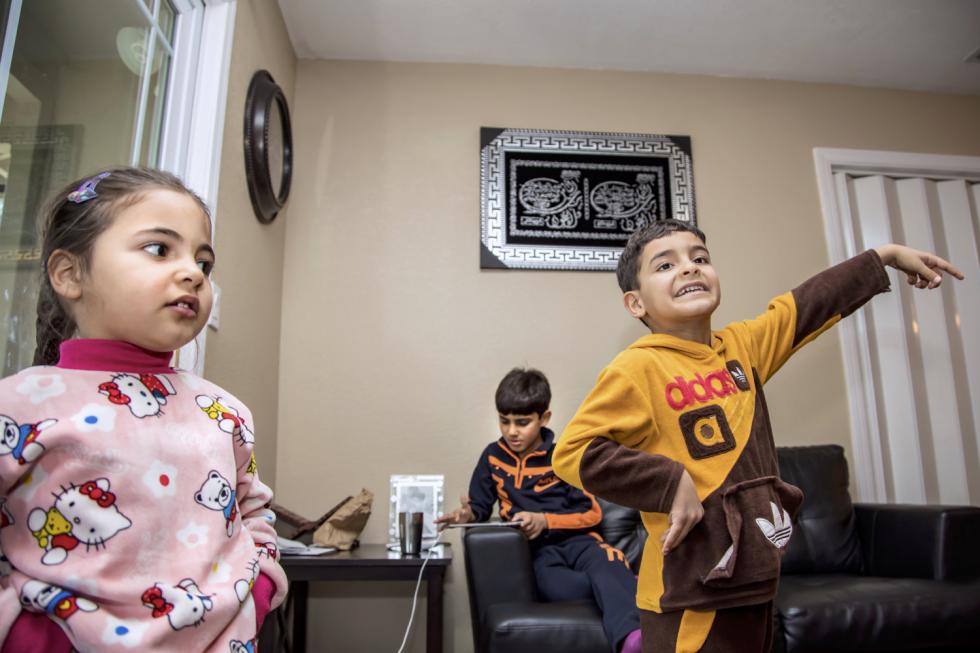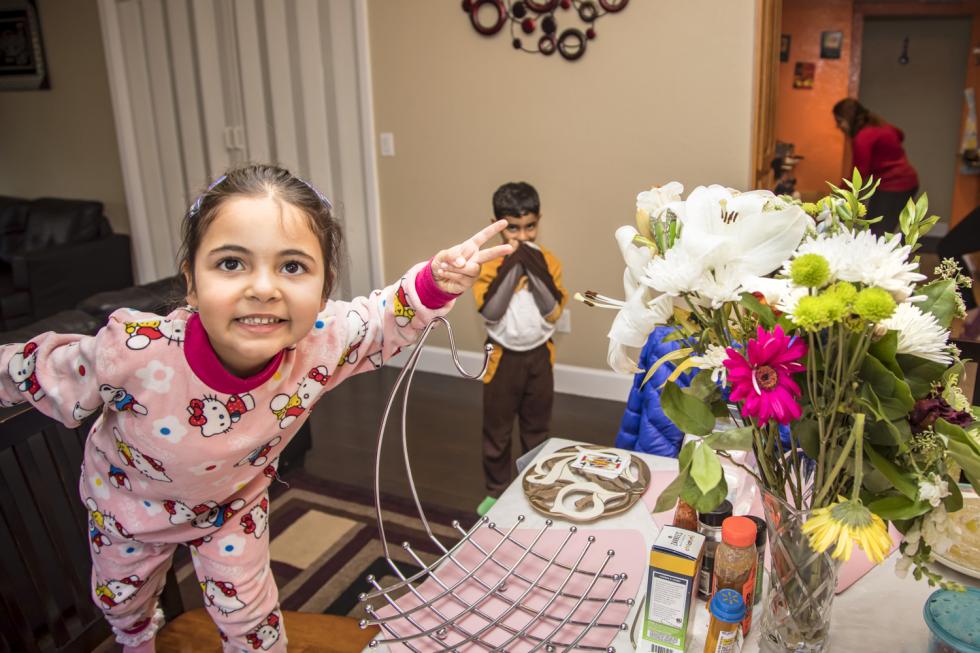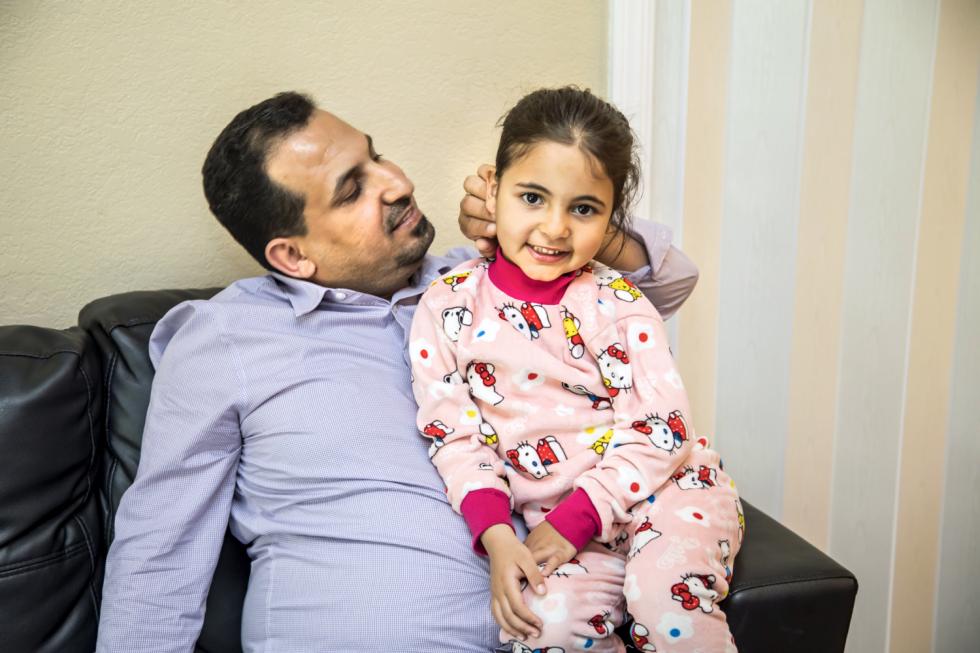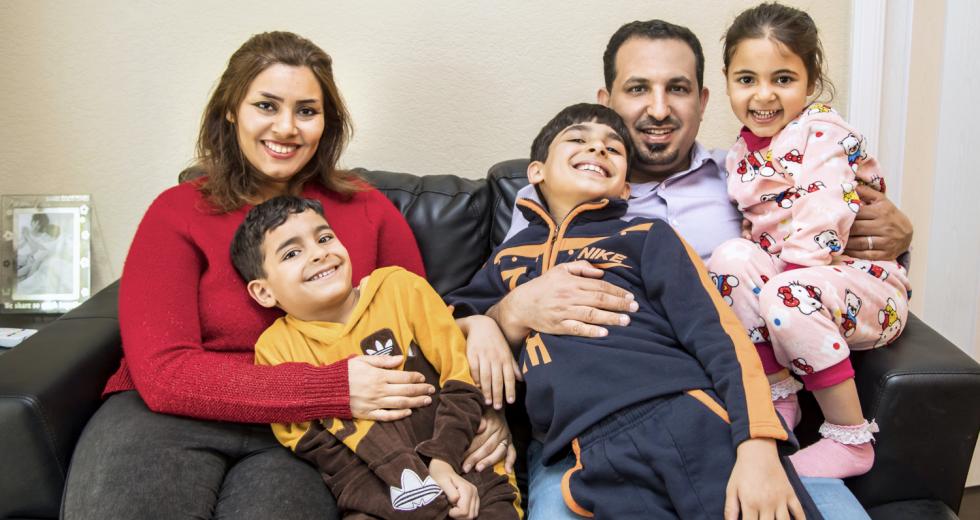As a teenager growing up in Iraq in the 1990s, Khaleel Yasir wanted to become a U.S. citizen. But his path to citizenship — like that of so many others — turned into a decades-long journey.
Photo Gallery: One Family’s Journey to Citizenship
Yasir spent nine years as an interpreter for the U.S. military before he could get an interview for a Special Immigrant Visa. Then, after coming to the U.S. in 2012, he had to wait five years before he could become a naturalized citizen.
Where to Get Help?
Local refugee resettlement and naturalization services are provided primarily by four organizations – two operating globally, and two operating locally.
International Rescue Committee
responds to the world’s worst humanitarian crises, providing medical, economic and legal assistance and refugee resettlement.Opening Doors
provides a range of services to refugees, immigrants, human trafficking survivors and underserved Sacramento area residents.Sacramento Food Bank and Family Services
works with the Diocese of Sacramento to offer immigration legal services and refugee resettlement services.World Relief
partners with local churches in 20 U.S. cities and 24 counties to provide refugee and immigration services plus global disaster response, health services and economic development.
“To be a U.S. citizen is my dream, and this has already happened,” says the 38-year-old father of three, who was sworn in as a new citizen on Feb. 22 at Sacramento Memorial Auditorium.
But Yasir learned early in life that good things do come to those who wait.
In 1999, he first met Zuhal Al Ameen in college. She is a Sunni Muslim; he is a Shiite. The Yasir family did not approve, and before long the couple parted ways. Yasir continued his college education and eventually took a job as an English teacher. “I never forgot about Zuhal,” he says. “I tried to find her.”
And he never forgot about his dream of immigrating to the United States.
Life as an Interpreter
In March 2003, a U.S.-led coalition invaded Iraq, and the war continued for most of the next decade. “When the U.S. Army came to Iraq, I was thinking at that time to go to the United States,” Yasir says. “I was going every day to talk with them and they said, ‘You speak English very good. Can you help us because we don’t have interpreter?’ I said, ‘Sure, why not?’ So they said, ‘We will pay for you $15 a week.’ Fifteen dollars a week is good in Iraq.”
The Yasir children play in the living room of their Citrus
Heights home.

During his first year, Yasir worked two jobs, as a U.S. interpreter and as an English teacher. “It’s really dangerous, especially for the interpreters,” says Yasir, who had a friend who was killed by Iraqi fighters.
During his second year, Yasir began working with Josh Fjelstad, then a first lieutenant and infantry platoon leader with the U.S. Army. Yasir took a year’s leave of absence from his teaching position to live on base, returning to his home only a few days a month.
On one of those trips away from the Army, Yasir was visiting another school campus when a woman wearing a burqa held up her hand to stop him. “Don’t you recognize me?” It was Zuhal Al Ameen. Seven years after the couple first met, their romance was rekindled.
“Before we got married, I told her that I’m going to be in the United States,” Yasir recalls. “So I asked her, ‘Are you agree to be with me in the United States?’ She said, ‘This is a good idea’.”
Yasir also talked to Fjeldstad about his dream to immigrate. When the officer’s one-year tour was up in January 2007, “He promised me, ‘I will not leave you here,’” Yasir remembers.
Baan points to the flowers on the dining table as her mother
prepares Sunday dinner.

Fjelstad asked — and received — his general’s recommendation and contacted the U.S. Embassy in Baghdad to set up an interview for a Special Immigrant Visa, a program that helps Iraqis who assisted the U.S. government. Those who qualify for the SIV program receive both a visa and a green card. Under the standard immigration path, refugees receive only a visa and must apply to be legal permanent residents (green card holders) after they arrive in this country.
Delaying the Dream
As Yasir awaited news about his visa, the young couple planned a huge, three-day wedding for July 2007. Yasir estimates that nearly 4,000 people attended. But as one dream became reality, another was deferred again. “My mother said, ‘I don’t want to miss you. Please stay with us.’ So I talked to Josh to just hold my status for a couple years.”
Yasir and his bride remained in the city of Nasiriyah. In 2008, after his widowed mother passed away, he asked Fjelstad to restart the process. “So he talked to the U.S. Embassy, and they said they would process from the beginning. It would take longer.”
It took two years — from 2009 until 2011 — before the couple was called for interviews at the U.S. Embassy in Baghdad. Months later, they each received a Special Immigrant Visa. In June 2012, the family arrived in Sacramento, with the help of the International Rescue Committee. Their son Mostafa was 3; their younger son Zain was only 9 months old.
“When we arrived, the IRC set up an apartment and made appointment with the clinic, the doctors, for the children, for us,” says Yasir, who now does the same work as a caseworker for World Relief Sacramento. “The first week of our arriving we had an appointment with the refugee health clinic. They said, ‘We have immunization for Zuhal. If she’s pregnant, we cannot give her that vaccines.’ They test, they check and say no, she’s not pregnant.”
So the clinic administered the MMR vaccine. Days later, she became ill and went back to the doctor. A second pregnancy test was positive. “Then (our daughter) Baan came into the world,” Yasir says. “Was a beautiful thing.”
Becoming U.S. Citizens
Four years and nine months after receiving a green card, permanent residents can apply to naturalize as U.S. citizens. Yasir turned to coworker Ted Oswald, an immigration attorney at World Relief, to help with the process.
Khaleel Yasir with daughter, Baan, who was born in the United
States.

In addition to refugee resettlement, World Relief Sacramento helps low-income residents prepare their naturalization application. According to Oswald, a State of California grant allows the normal $725 fee to be waived or reduced. After the paperwork is filed, there are two more steps before naturalization — a “biometrics appointment” for fingerprinting and photo-taking, and an in-person interview with U.S. Citizenship and Immigration Services. During the interview, an immigration officer reviews the application, administers a basic English test and gives a 10-question U.S. civics test. If the interview goes well, prospective citizens are scheduled for the next naturalization ceremony.
On Feb. 22, Khaleel Yasir and Zuhal Al Ameen were among 1,060 residents from 81 countries taking the oath of U.S. citizenship in Sacramento. Friends and family joined them for the ceremony at Memorial Auditorium. So did Fjelstad, who now lives near Auburn, and his sister-in-law, Joy Justus, who happens to work with Yasir at World Relief.
The new citizens are already buying a home in Citrus Heights. As for the future, Yasir has his eye on a position with the State of California, and his wife plans to get an “office job” when Baan starts kindergarten in the fall.
Yasir stays in contact with his six brothers and three sisters in Iraq, and plans to get a U.S. passport so he can visit them. He’s also looking forward to registering to vote in his first U.S. election.
“I was worried when Trump banned travel,” he says. “I was worried to not get [my citizenship], to be honest. Everyone, all the refugees, are worried about this thing. So when I got [citizenship], our friends congratulate us and they said ‘We don’t know our future. We don’t know if we can get it or not’.”
But for Khaleel Yasir and his family, the long wait for U.S. citizenship is finally over.




Comments
As I read about Yasir it make me so sad because he is very nice and honest person he was my case worker he help me a lot and a week ago I meet him.
I m felling so uncomfortable and so sad for him
Thanks for highlighting Khaleel!